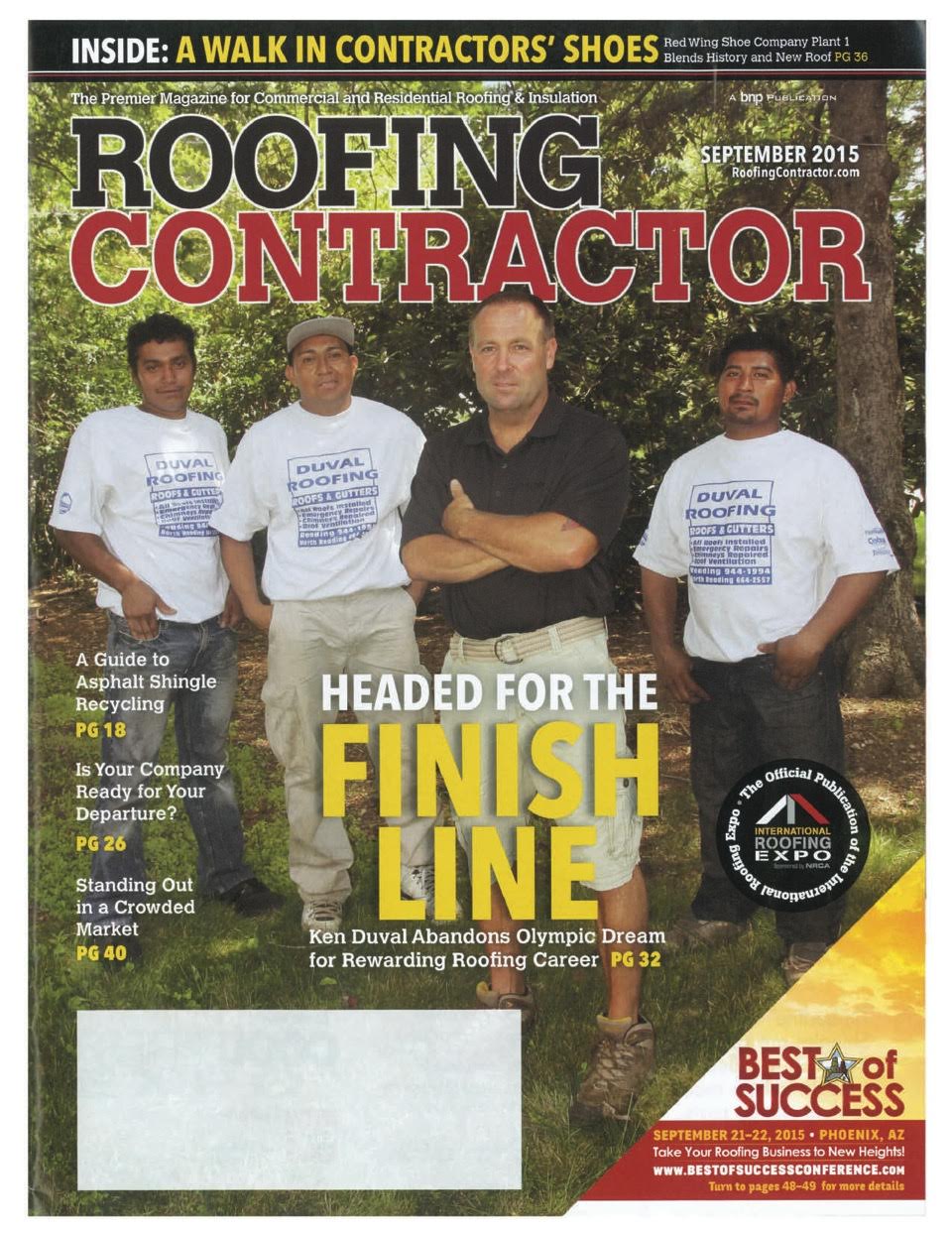Sign up for our 10/7 webinar more insights & tips on PR thinking for link building & content teams.
 The September edition of Roofing Contractor Magazine features an atypical hero. Ken Duval is not in a business suit, nor does he manage a conglomerate of hundreds of roofers like his front page predecessors do. Instead, Ken’s story is as much about personal development and innovative thinking as it is about his industry game-changing tactics. His feature mentions a rough childhood and young adult Olympics opportunity before sharing his innovative eco-friendly roofing practices.
The September edition of Roofing Contractor Magazine features an atypical hero. Ken Duval is not in a business suit, nor does he manage a conglomerate of hundreds of roofers like his front page predecessors do. Instead, Ken’s story is as much about personal development and innovative thinking as it is about his industry game-changing tactics. His feature mentions a rough childhood and young adult Olympics opportunity before sharing his innovative eco-friendly roofing practices.
Duval Roofing‘s cover story is what happens when PRs pitch like journalists.
Before the Jump: Why We Branched Into PR
At Citation Labs, we’re constantly in the throes of experimentation when it comes to building awareness for our clients. Along with many others in online marketing, we know that the days of siloed departments are over. In order to speak to the current market need for big-picture marketers, SEOs need to learn how content, social and PR bring traffic and brand awareness. When PR industry veteran, Ken McGaffin came on board, we had the unique opportunity to establish PR practices from a link development perspective.
In the past year, we’ve added a journalist search to our Link Prospector and surveyed our tool users to measure SEOs’ current level of comfort with PR. And in early 2015, Duval Roofing became Citation Labs’s first PR client.
A Tale of Two Kens
Like McGaffin, Ken Duval is also a veteran of his trade. Over the past 25 years, Duval Roofing has built roofs on 5,500 homes in the Boston North Shore region, including a former Kennedy mansion/bootlegging hotspot on Cape Cod. Duval and his web marketing consultant Vicki Mills hired Citation Labs to build press around the company to encourage inbound links and ensure the local community saw his business in a positive light.
Our Campaign:
Goals
- Build positive (local and national) press & links around Duval Roofing for organic search results.
- Develop relationships with local press, establishing Duval as a go-to source on roofing matters.
Plan A: The “Timely” Angle for Local News Updates
Duval’s region – Boston, Mass. – received record-setting snowfall last winter, causing an unprecedented number of roof damages. A follow-up on this event seemed like the perfect first round pitch for local press contacts.
The Pitch:
“100 Year” Winter Still Affecting Massachusetts Homes…
As we approach National Roofing Week (July 5-11), New England homeowners are still dealing with the aftermath of last winter’s damage. Even though (most of) the snow in Massachusetts has melted, many roofs are still suffering from from its effects, especially those that sprung leaks from the weight of last winter’s heavy precipitation.
Ken Duval of Duval Roofing in Reading, Mass. has streamlined his process to be able to replace an entire roof in just one day – saving homeowners both money and stress. This is especially helpful to his customers, as inquiries have doubled compared to the same time last year.
Would you like to talk to Ken about the roofing problems still emerging from the winter damage and to learn more about this year’s blizzard of roofing repairs?
The Process:
1) Find Boston journalists who’d covered the disastrous winter weather.
2) Pitch stories on snowfall’s lasting roof damage along with Ken’s advice to prevent more winter weather damage.
Results:
Pitching journalists blind is not easy (hence our need for Plan B), but we also found that local journalists weren’t covering the lasting effects of the New England snowstorm in great volume. By summer, it seemed that everyone was sick of talking about snow.
Plan B: The “Early Adopter” for Tech/Entrepreneur Stories
Early on, we learned that Duval Roofing uses EagleView Technology for quotes. Instead of hiring a salesperson to drive out to each house and measure roofs all day, EagleView’s aerial photography allows Duval to make accurate quotes from home.
We also found out that after the Boston Blizzard, Duval purchased a steam machine from the midwest. Among the first of its kind in Massachusetts, it’s the only roof-safe way to remove ice dams from homes.
Together, these stories tell the tale of an early adopter roofing contractor and innovative roofing contractor.
The Pitch:
Technology Is Changing The Home Repair Industry; But Not All Bay State Roofers Measure Up
Many homeowners are relying on roofers who use old-fashioned eyeballing methods for quotes and material requests.
Ken Duval of Duval Roofing in Reading, Mass., is one of the few roofers in his area who’s embracing technology at the peak of his industry. He was the first in his area to purchase a steam machine from Minnesota in preparation for another ice-dam heavy Boston winter, and he also uses EagleView Technologies’ aerial imaging and measurement technology for quote requests and material scoping. EagleView uses a fleet of airplanes who fly 365 days a year around the US, capturing 5 top-down and oblique images (at 45 degree angles) of roofs, allowing them accurately to map out the slope.
“Before I had this tech, I would have to go to every single house and measure the foundations and guess a little of how much it is from the bottom of the roof to the top,” Duval says. “Then a homeowner would call up and say ‘oh I got a lower quote from another roofer,’ but just he had a lower quote because he messed up his measurements.”
Ken also uses EagleView maps for labor division, making sure work assignments are fair to the square foot. That may be part of the reason many of Duval Roofing’s employees have been with the company for more than 10 years. And this winter, they’re adding a steam machine to the team.
The Process:
1) Find local and national journalists who cover entrepreneurs embracing technology.
2) Pitch Ken’s ice dam machine as first in the Boston region along with his EagleView adoption.
Results:
On their own, these pieces weren’t enough to entice tech journalists. Reporters wanted the story of innovation, not just early appropriation.
Plan C: HARO
As an established local business, Duval Roofing had enough history to fulfill entrepreneur-based HARO requests. We were especially searching for ways to show off Duval’s expert local marketing development.
Process:
1) Check daily HARO emails.
2) Highlight requests that could align with a Duval Roofing story or business practice and interview Ken D. to get a few key quotes before sending the pitch.
Results:
We were featured in American Express OPEN Forum and on a couple of other news sites. But the real story came because of a HARO pitch, not through it. When interviewing Duval for a journalist questionnaire, we learned more about the person behind the business.
The Pivotal 3-Hour Off-the-Cuff Conversation With Our Client
We’d interviewed Ken D. before, but this time, perhaps because we weren’t searching for them, the stories came out. Coming from a more journalistic background (as a college newspaper reporter and free-time fiction writer), I didn’t ask questions for the sake of uncovering the story I was hoping to pitch. He mentioned difficult times as a young adult, so I asked more about that. He also mentioned the luck behind his ownership of the company land, so I dug into its backstory.
A few hours later, we were brain drained with about 7 pages of notes.
Our resulting new pitch:
From Homeless to Successful Roofing Contractor: One Entrepreneur’s Summit Story
At 17, Ken Duval literally had no roof over his head. But thanks to risk-taking on an unwanted acre, the sacrifice of a place on an Olympic team and a lot of determination, Ken has developed an industry-leading small business in Reading, Mass. He now stands out as the only contractor in his area that owns his own waste transfer station, and he employs a team of roofers with such great organization and leadership that they finish installing most new roofs in an astonishing 8-hour day.
Homeless at age 17 due to family issues, Ken couldn’t afford college, and instead went to work for a large roofing company.
After he was laid off during the late 80’s recession, Ken poured all of his funds into one truck and used it to take odd fix-it and roofing jobs. He made the US Kayaking team, placing first in team trials, but had to forego training to qualify for the Olympics to devote time to his growing business. Thirty years later, Ken owns of one of the most innovative and green roofing companies in Massachusetts.
Unlike other roofing companies, which must pay to transport most waste to commercial transfer stations, Duval Roofing is able to recycle 90% of their debris, thanks to their company-owned transfer station, saving the environment (and dollars) on each project. The history of the 3-acre commercial site (which can accept and store tractor-trailer loads of shingles and other roofing materials) involves a property no one else wanted and Ken’s risk-taking acumen, which clearly paid off.
“Other roofers have to go to the warehouse and pick up the materials for the day or have the materials dropped off; I can be flexible based on weather or customer needs.”
Ken’s eco-friendly practices also extend to his customer quote practices. He embraces EagleView’s Technologies’ aerial imaging and measurement technology to map roofs for pricing and materials, instead of driving out to manually measure for each quote.
“The ability to extract measurements from an image is relatively new,” says Karen Edwards, Marketing Director for EagleView Technologies. “It’s important that roofing contractors embrace technology because if they don’t, they will be left far behind their competition.”
“Before I had this tech, I would have to go to every single house and measure the foundations and guess a little of how much it is from the bottom of the roof to the top,” Duval says. “Then a homeowner would call up and say ‘oh I got a lower quote from another roofer,’ but just he had a lower quote because the other roofer messed up his measurements.”
Ken also uses EagleView maps for labor division, making sure work assignments are fair to the square foot. That may be part of the reason many of Duval Roofing’s employees have been with the company for more than 10 years. Ken’s management philosophy explains the rest:
“I’m part psychologist really,” he says. “When they’ve got to complain you’ve got to listen to them. Without them, where would I be?”
We reached out to Karen Edwards of EagleView with 90% of this pitch (all except for her quote) complete, eager for her statement from the EagleView perspective. Impressed with Ken’s story, she referred us to the editor of Roofing Contractor Magazine.
Results: The cover of a national magazine.
Lessons Learned
1. Interview your clients with a journalistic curiosity.
We made an early mistake by assuming we understood Ken Duval’s story based on a first or second phone phone call. In those preliminary conversations, we were learning the basics, but we didn’t yet know what made Duval Roofing unique. To Duval, his “potential Olympian” story him, is a life chapter long closed.
To others, it speaks to his commitment to his business and his sense of responsibility. Most of us have a few great stories in our back pocket, but we’re not always the best at determining which ones will most captivate others.
When we stepped outside the “news angle” asks, we learned why Ken Duval created dragon-shaped rain gutters for his own home and how he decides which employees to promote. This shift led to a new perspective for Duval Roofing’s story.
2. Craft your pitch like a short news story.
When the Roofing Contractor magazine piece came out, we noticed that significant slices of my original pitch survived until the final print. The pitch formed an outline for the quotes and stories revealed during later interviews. Ken M. and I considered this a huge win, because it meant that our pitch had truly sold the story.
3. Find the brand’s human side.
PR has a bad rap for being the sleazy person in the corner office twisting words while not actually saying anything.
(Or maybe that’s just what I thought PR was about when I was an outsider with a weird imagination.)
But PR is more than press releases and “cover your ass” comments. A good PR is a company’s bard, its storyteller. It takes interesting moments and quirky folks and gives them a space to show the human side of a brand.
Citation Labs has this whole thing with “Mission Based Marketing” – we believe that the best campaigns come from somewhere in the heart of a company, to serve a purpose bigger than a pocket. PR, we’ve learned, is another side of this story. It makes the mission into a memoir.


